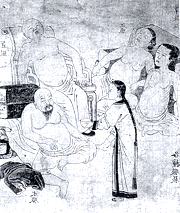In TCM, colorectal cancer has a similar clinical presentation to Western medicine; however physicians also focus on changing symptoms, the individual's constitution, and the order in which symptoms appear. TCM practitioners first carry out a comprehensive consultation to gather an accurate picture of the internal disharmonies before implementing treatment. See article on "What to Expect from a TCM Doctor's Examination". The usual disharmony patterns caused by colorectal cancer are as follows:
1. Downward migration of damp-heat
Individuals present with abdominal cramps, diarrhea with mucous and bloody stools and tenesmus (painful, ineffectual straining to empty the bowel). There is a burning sensation in the anus and a palpable abdominal mass. Other associated symptoms include fever, aversion to cold, thirst, mouth dryness and general weakness.
 |
| TCM illustration showing different kinds of abdominal distention. |
2. Excessive accumulation of poisonous pathogens
The main presentations are poor appetite, feverish sensation accompanied with chest oppression, thirst, abdominal distention and cramping and severe diarrhea with mucous stools (which are dark purple in color).
3. Interior retention of blood stasis
Individuals present with an abdominal mass accompanied by fixed and persistent pain, abdominal distention, straining when defecating, diarrhea with pus and blood, a grayish complexion and a skinny appearance.
4. Deficiency in qi (vital energy) and blood
Individuals present with a pale complexion, light-colored lips and nails, general weakness, shortness of breath, bland taste in the mouth, poor appetite, full sensation in the epigastric region, tenesmus (painful, ineffectual straining to empty the bowel) or anal prolapse in severe cases, malnutrition and a skinny appearance.
5. Yang deficiency in spleen and kidney
Individuals present with a pale complexion, general malaise, apathy, aversion to cold temperatures, limb coldness and poor appetite. There can also be abdominal pain and distention, diarrhea in the morning and weakness and soreness in the lumbar (lower back) and knee regions.
6. Yin deficiency in liver and kidney
Individuals have a skinny appearance, dizziness, ringing in the ears, hot sensation in the chest, palms and soles, insomnia with nightmares, lumbar soreness, leg weakness and constipation with or without abdominal pain.
|